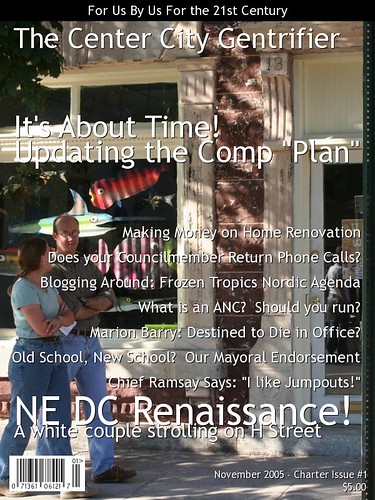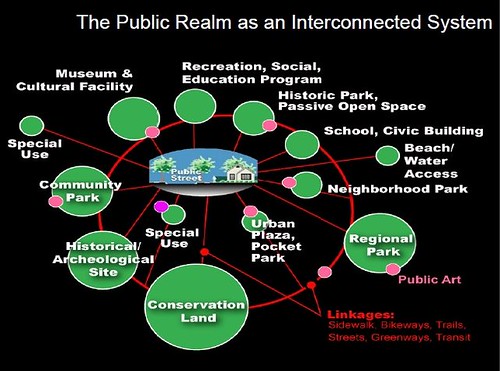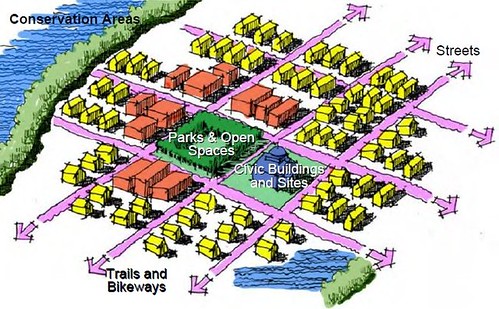New years post #5: DC City Council Committees and striving to be a world class city
One of the problems of being a career person, an advocate, and a blogger all focused on the same general topics of urban revitalization, commercial district revitalization, and sustainable transportation planning is that you frequently switch from role to role and because of the blog, the people that you are dealing with often have a difficult time distinguishing between "critical analysis" versus what they perceive as "personal criticism."
Note though that DC Council committees are very lightly staffed, and don't have the kind of heft necessary to be able to do thorough research and reports. That's something that needs to be addressed too.
Here are some breakthrough agenda items for DC Council committees:
• Jim Graham (Ward 1) - Human Services
-- "The Oakland Project: Paying-the-Poor Program Relies on Self-Sufficiency" Governing Magazine.
• Jack Evans (Ward 2) - Finance and Revenue
- come up with a system that explains simply the sources of tax and other revenues for the city (income, property, sales, etc.) and the costs of servicing commercial and residential property. The progressives wildly advocating for attracting families to the city seem to forget that it is very expensive to "service" families, as each child costs $15,000/year or more to educate, and many households pay less than this in taxes
- an issue that I focused on for many years is how the national-international market of commercial real estate in the Central Business District has led to an overvaluing of commercial property throughout the city, in a way that is particularly damaging for commercial retail buildings, especially in local commercial districts. Even in marginal commercial districts, asking pricing for retail rents are at least $35/square foot, which is much higher than the revenue generating capacities of most of the buildings. The commercial property tax assessment method needs to be changed to differentiate between "Downtown"-type commercial property and small buildings in local commercial districts. I testified about this for many years, but it never seemed as if the Councilmembers could grasp the argument.
- come up with a master system for requesting tax incentives, involving this committee and the Chief Financial Officer, so that there is one, open, and transparent system for requesting, reviewing, and monitoring tax breaks.
- open up the tourism tax revenue stream (hotel taxes, meals taxes, parking taxes, car rental taxes) to supporting cultural initiatives more broadly. Mostly this money now pays for the Convention Center.
-- Allegheny County Pennsylvania (Pittsburgh and vicinity) Regional Asset District
-- "Make Eminent Domain Fair for All," Boston Globe (the process they outline should also be applied to tax incentive and abatement decisions
• Mary Cheh (Ward 3) - Government Operations and the Environment
- pass an open meetings act that isn't bullshit (see "D.C. Council wrongly exempts itself from open-meetings reform law" from the Washington Post)
- require that posted DC government metrics and "performance" data (Track DC) be significant and usable, rather than mostly fluff
- come up with a significant training and capacity building regime for ANCs and civic organizations and interested residents
- with regard to the environment, how about urban agriculture, and urban orchards on unused reservations
- and engaging citizens and the city in a substantive fashion into the sustainability movement
Resources
• Muriel Bowser (Ward 4) - Libraries, Parks and Recreation
- Add arts and culture" to the purview of this committee.
- Use the concept of an "integrated public realm" as an organizing framework for the action agenda of this committee.
- DC doesn't have a Parks and Recreation Master Plan, make this an issue, get it done.
- DC doesn't really have a publicly vetted Libraries Master Plan, make this an issue, get it done.
- The Arts and Culture element of the Comprehensive Plan is reasonably pathetic, do an Arts and Culture Master Plan of real weight (see above about the tourism tax revenue stream).
Resources
-- See the blog entry "Step up and vision an interconnected public realm.
-- Cultural Planning Toolkit
-- read local parks and recreation master plans such as Arlington and Montgomery Counties, and even Baltimore County.
-- See the blog entry "Cultural resources planning in DC: In the land of the blind, the one-eyed man is king"
-- blog entry, "Central Library Planning efforts and the City Museum, how about some learning from Augusta, Maine ... and Baltimore?"
-- Creative City Network of Canada
• Harry Thomas, Jr. (Ward 5) - Economic Development
- some day I will write a journal article on the difference between "building a local economy" and "economic development." There is a difference. Building a local economy focuses on developing and retaining not just businesses, but profits and investment capital locally. It's about the multiplier effect from purchasing. Businesses located here but owned elsewhere end up exporting profits elsewhere. And businesses not located here can easily be moved.
- so a local economic development agenda needs to be created for the development of a more balanced economy, one that is not hyper dependent on the federal government. E.g, I was impressed but terrified that the new business improvement district in Ballston ("Arlington OK's Ballston BID" from the Washington Business Journal) is going to focus in part on developing Ballston as "a hub for science and technology" because other than promoting real estate development, retail, and maybe transportation demand management, DC business improvement districts don't really take on economic development in this fashion...
- that means focusing too on the economic development capabilities of DC-based universities -- many firms get started at local universities, but they end up locating in the suburbs.
- and developing a truly robust creative economy plan (we actually have one that is pretty good, surprisingly, now the challenge is execution, and that includes the DC City Council) and focusing on the knowledge economy outside of the law firms, lobbing companies, and trade associations that are focused on the federal government.
- Supporting commercial district revitalization and retail entrepreneurship in significant ways. Make DC a leader in this area, instead of "me too" or unconcerned when it comes to substance.
- Reduce the regulatory burden on small businesses.
- Develop a Tourism Management and Development Plan, which later should become a separate element of the DC Comp Plan.
Resources
-- Economic Development Element, DC Comprehensive Plan
-- Community Economic Development Handbook
-- "Premier-ranked Tourist Destinations: Development of a Framework for Analysis and its Self-guided Workbook"
-- Montreal's Board of Trade released a report on the role of transit in their region, Public transit: a powerful economic-development engine for the metropolitan Montreal region
-- Creative City Network of Canada
-- The Economy of Cities and Cities and the Wealth of Nations by Jane Jacobs
• Tommy Wells (Ward 6) - Public Works and Transportation
- DC doesn't really have a Master Transportation Plan comparable to that of neighboring jurisdictions. Sure the "state" of DC has to produce a long range state transportation plan and give it to the US DOT, but compared to Arlington County, we don't have a thorough and deep transportation plan. Instead, the Councilmembers legislate all kinds of "stuff" ranging from parking districts, to committees to oversee the streetcars, to how much parking meters should cost downtown in order to fund human services. That should stop.
- DC should have a Master Transportation Plan. City Council should get DDOT to do it. Make transportation demand management planning required!!!!!!!!!!!!!!!!!!! And set metrics and level of service standards to limit the creation of politically-inspired bus services, etc.
- San Francisco has enshrined in their city charter, a "Transit First" mobility and land use policy. DC needs one.
- Comparable to the Zoning Commission, DC should create a Transportation Commission, to address transportation issues of all sorts, in the context of land use, economic development, and mobility decisions. Arlington has one, so does Alexandria and Rockville (and Tempe, Arizona). While the Office of Zoning has increased their consideration of transportation issues, it's not enough. To make evident how important transportation is to DC's quality of life and economic competitiveness, let's create a transportation commission.
- Perhaps DC should reconceptualize the streetcar network that is being developed within the city somewhat independently of the Metro system, comparable to how the MUNI system in San Francisco is separate from but integrated with the BART regional subway system. I am not sure about this, but CM Wells' committee could study the issue.
- Ideally, the metropolitan area's separate railroad passenger commuter systems should be integrated into one regional railroad passenger service with 18/7/365 service. DC, not being either VA or MD, could help bring the two states together and join in.
- Instead of parking performance districts willy nilly, create the framework of "transportation management disticts" and plan and implement accordingly.
- Explore and build the support for a transit withholding tax on people working in DC. 70% of the people in DC don't live in the city. We need more money to pay for the necessary transportation infrastructure to support their entry into and exit out of the city, as well as local needs. This is an issue because typically the federal government is exempt from such programs. However, it has recently been held that federal agencies will now pay for stormwater system charges, maybe this is the breakthrough we need.
- with regard to public works, add initiatives on citywide composting (Toronto cut its trash in half by separating and composting organic materials), and as a waste reduction and business development initiative, harvesting of downed trees for lumber and firewood. Develop waste reduction initiatives with regard to dumped materials at the trash transfer stations.
Resources
-- Arlington County Master Transportation Plan
-- Seattle Bridging the Gap transportation and streetscape funding initiative
-- Seattle Urban Mobility Plan
-- Oregon Payroll Transit Tax
-- San Francisco Sustainable Mobility Agenda presentation
-- San Francisco Transit-First Policy
-- blog entry, "Regional transportation planning and fixed rail service"
-- "Goodbye, foreign landfill" from the Toronto Star
• Yvette Alexander (Ward 7) - Public Services and Consumer Affairs
- Create a civic engagement element for the DC Comprehensive Plan that also functions as a citizens bill of rights with regard to government openness and transparency, including open meetings act provisions. One thing such an element should forbid is scheduling meetings in places with extremely limited transit service, which is a tactic specifically designed to limit public participation.
- Continue to improve the Department of Consumer and Regulatory Affairs.
- Develop a specific agenda to reduce the regulatory burden on small businesses either seeking to open or already in business in DC.
Resources
-- "Lattes at the Regulatory Cafe," an article from the Claremont Institute which explains how difficult it can be for independent entrepreneurs to open businesses
-- Seattle Customer Bill of Rights
-- Deepening Democracy: Institutional Innovations in Empowered Participatory Governance"
-- International Association for Public Participation
-- International Association for Public Participation Spectrum of Public Participation
• Marion Barry (Ward 8) - Aging and Community Affairs
- See the stuff in the previous entry about a civic engagement element.
- Senior centers shouldn't be standalone facilities, they should be integrated into recreation centers and other facilities. For example, Baltimore County has a combined library and senior center in Pikesville. Senior centers are closed at night, when if part of an expanded facility, the facilities could be used by others.
- Create and implement the schools/community centers concept.
Resources
-- Alianza's Beacon School concept
-- Price Charities City Heights Initiative, San Diego
-- Schools as centers of communities planning guide
• David Catania (At-Large) - Health
- adopt the public health model approach to guide health care planning and decisionmaking in DC. You see, the problem with health care and the insurance model is that health insurance was created not to promote health, but to regularize the income of hospitals during the Depression. Building a system focused on health and wellness requires a different model.
- for a long time, I have argued for the (re)creation of community public health clinics/centers to deliver a lot of the basics of health care, and oversee the management of chronic disease, comparable to how clinics at pharmacies and supermarkets do it, but also to deliver health and wellness programming. I thought it was a great innovative idea, until I learned that Christopher Alexander called for the same thing in his book Pattern Language (1979). No city or county really does this. It's the kind of thing that should have been in the Health Care reform initiative and wasn't. If DC really did something like this, it would truly be a world class initiative.
- getting behavior choice related diseases under control (obesity, high blood pressure, diabetes, heart disease, alcoholism and drug related problems) would save the city tons of money.
- consider working with Prince George's County on more regional approaches to dealing with the provision of hospital based care, given that the Prince George's County Hospital system, the United Health Care Center in DC, and Howard University Hospital all have financial issues.
Resources
-- the blog entry "Rethinking health care service delivery in significant ways is not likely to happen in health care 'reform'" has links to most of my entries on this topic
-- American Public Health Association
-- Center for Science in the Public Interest
-- Centers for Disease Control and Prevention
-- blog entry, "Speaking of hospitals and regional equity"
• Phil Mendelson (At-Large) - Public Safety and the Judiciary
- really develop community (problem oriented) policing. While murder rates are dropping, there are still problems with other types of crime. See "District, Prince George's report continuing decline in number of homicides" from the Washington Post.
• Michael A. Brown (At-Large) - Housing and Workforce Development
- DC needs a citywide discussion about what "gentrification" means, and how to address displacement.
- Relatedly, we need a housing policy and plan that deals with both owner occupied and rental housing. I don't like to use the word gentrification, but there is no question that as housing prices increase, people get displaced. Addressing this requires a variety of tools, including property tax assessment methods, community land trusts, cooperatives, portfolio investment, etc. As long as housing is addressed almost solely in terms of "the market" people of lesser means will be priced out.
- Similarly, with regard to workforce development, we need a great Department of Employment Services, integrated with the K-12 and college education system. We have to figure out why such a large swath of the city's population is unemployable and deal with it.
- merge the summer youth employment program into a year round effort including a form of cooperative education at the high school level
Resources
-- Blog entry, "More about contested spaces and gentrification
-- National Community Land Trust Network
-- Gentrification and Resistance in New York City" from Shelterforce Magazine
-- "Cooperative Education: Characteristics and Effectiveness"
-- Cooperative Education in High School: Promise and Neglect
• Kwame Brown, City Council Chairman - Committee of the Whole + Education
- ideally, the capacity of City Council committees to do high quality research and policy development should be enhanced
- with regard to education, while Mayor Fenty's recognition that the problems with the schools needed to be addressed, his "bomb the schools" approach via Michelle Rhee was a huge mistake. First, it didn't really address the fundamental issues, instead blaming teachers. Second, it should have used a "positive deviance approach" and recognized the high performing clusters already existing within the school system, e.g., at the elementary school level, language programs like Oyster, the Capitol Hill Cluster Schools, and Montessori programs, and extended and expanded these programs. Third, a significant professional development program for schools, teachers, principals, and families needs to be created, not a bullshit thing like what has been done.
Similarly, with the charter school movement and the voucher bullshit, community social and organizational capacity is dissipated and deconcentrated, breeding chaos and reducing the energy and ability and capability for truly improving the system.
It doesn't matter that people feel better about it, it's basically a flawed effort. Even if billionaires want to throw money at Michelle Rhee, that doesn't mean that they know what they are doing.
- consider year round schooling
Ideally, the City Council could help to build a new community consensus on how to approach school improvement.
Resources
-- "Bucking School Reform, a Leader Gets Results" New York Times (this school superintendent in New York City was not supported by the Bloomberg reform narrative, but schools under her supervision for the most part outperformed the rest)
-- "From Hunger Aid to School Reform"
-- "Your Company's Secret Change Agents," article from Harvard Business Review on positive deviance
-- Marion Orr, Black Social Capital. The Politics of School Reform in Baltimore, 1986-1998
-- Clarence Stone, "Civic Capacity and Urban Education"
-- Building Civic Capacity: The Politics of Reforming Urban Schools
-- Roy Strickland "Integrating Primary and Secondary Education with Community Life: Designing Cities of Learning
-- "Year Round Schooling," review, Education Week
-- National Association for Year Round Schooling
-- Baltimore County Capital Improvement Planning process
---------
Labels: change-innovation-transformation, civic engagement, good government, progressive urban political agenda, public administration, sustainable land use and resource planning, world class cities







0 Comments:
Post a Comment
<< Home